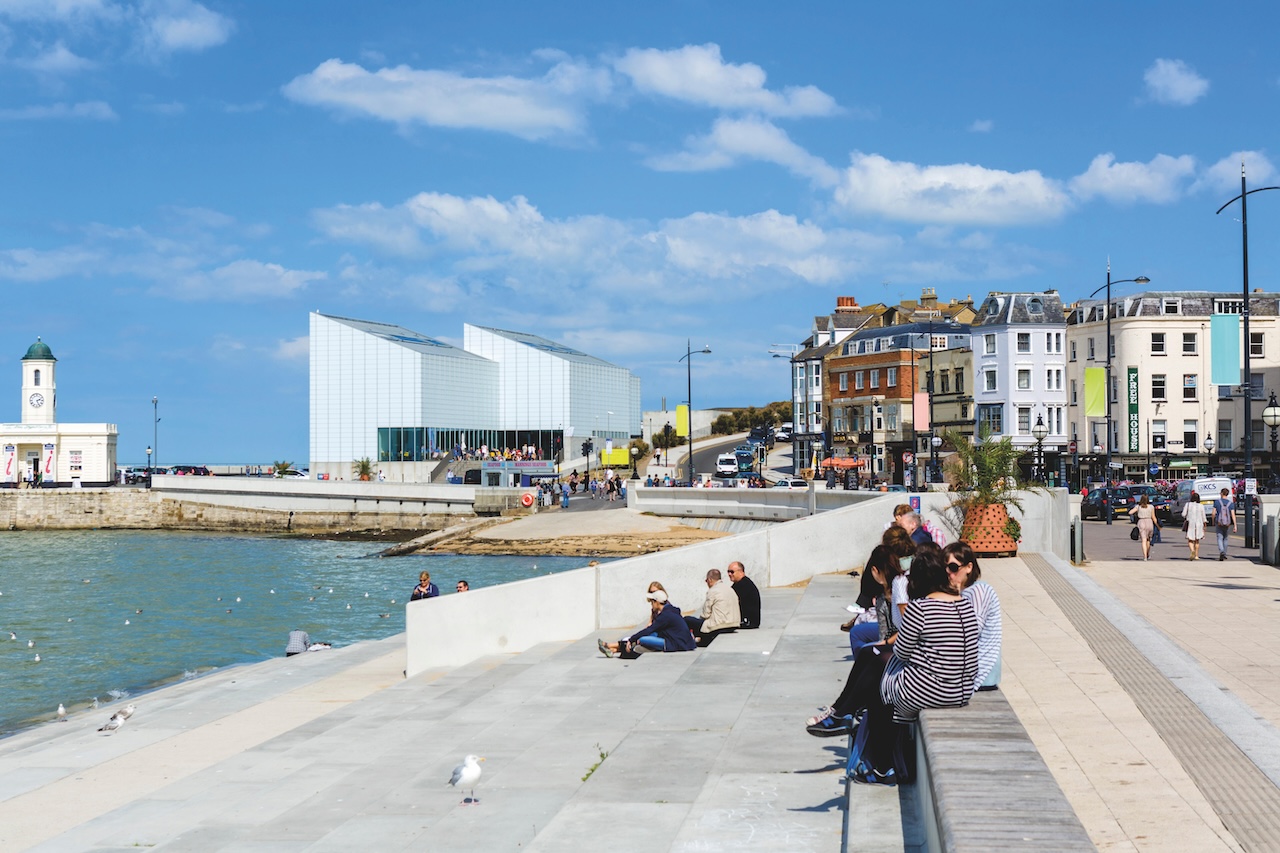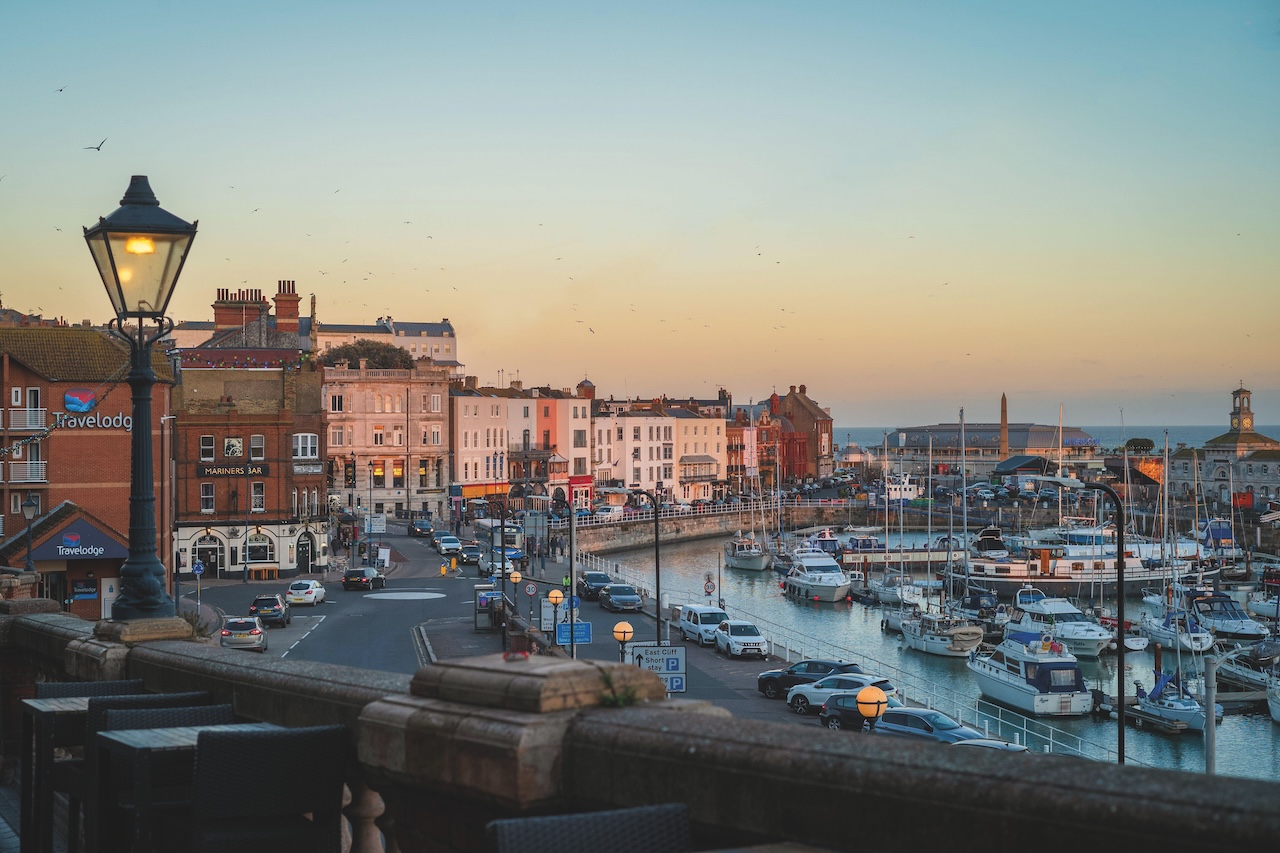'Papering over the cracks': How do locals really feel about tourism in Britain’s seaside towns?
JD Wetherspoon's Royal Victoria Pavilion in Ramsgate, Kent (PA Images / Alamy Stock Photo)
9 min read
Tourism and regeneration bring tensions as well as benefits to Britain’s seaside towns, as Sienna Rodgers discovers on a trip along the Kent coast
Walk out of Margate station and you’ll find the beach straight ahead. On the right, a tall Brutalist block punctures an otherwise empty sky. On the left, the frayed awnings of a run-down hotel covered in peeling paint flutter in the wind.
On first impressions, there is little sign of the famous regeneration that has apparently transformed the Kent town from a dilapidated seaside resort into the east coast’s answer to Shoreditch. It is only when venturing further along the seafront, past the flashing arcades and large vacant retail units, that the new hipster hotspots emerge – a coffee shop serving negronis and grilled cheeses here, a tastefully rustic seafood restaurant there.
“Some people describe it as the largest latrine in the world. Others regard it as a piece of splendid modern architecture”
Rebranding Margate was a task on The Apprentice in 2009. One team of potential Lord Sugar employees pitched “the pink pound” as their big idea; the other team dug deep into their imaginations to sell the town as a family-friendly destination. What fuelled the regeneration in reality was the opening, two years later, of the Turner Contemporary art gallery, which has successfully pulled in tourists ever since.
“Margate was one of the original seaside towns. Its heyday as a fortnight-holiday-by-the-sea destination was in the 1950s, early 1960s, before everybody discovered cheap booze and sun and sex in the Mediterranean,” says Roger Gale, the Conservative MP for North Thanet.
Originally, he recalls, outsiders would buy B&Bs on the coast – some with the dowry they received upon leaving the armed forces – and return only to run them through the short summer season. Without investment, properties became dilapidated. When Gale arrived in 1983, Margate had gained the nickname “Dole on Sea”. “People would come and live on the dole,” the MP explains. “It was all very unhealthy. And try as we might, we couldn’t really turn it around.”
Over the decades, the Thanet town went further downhill, with the noughties marking the closure of amusement park Dreamland, which had been a key asset. Then came the Turner. “That really was the turning point. We fought like hell to get it,” Gale recalls. Designed by acclaimed British architect Sir David Chipperfield, it has won awards, though its clunky appearance divides locals.
“It’s one of those buildings you either love or loathe. Some people describe it as the largest latrine in the world. Others regard it as a piece of splendid modern architecture,” remarks the MP, who notes that it faces inwards rather than looking out to the sea. One local says it is disparagingly known as “the fish factory”.
 The promenade and Turner Contemporary in Margate (Credit: Ian G Dagnall / Alamy Stock Photo)
The promenade and Turner Contemporary in Margate (Credit: Ian G Dagnall / Alamy Stock Photo)
Every Thanet resident who speaks to The House welcomes the revival of Margate as a tourist destination, but many express reservations too.
Rick Everitt, Thanet District Council’s Labour council leader, says 6,000 jobs in the area are thought to be based on tourism, which is worth about £200m to the local economy. He is concerned, however, by the rubbish left on the beach, costing £120,000 a year to manage, anti-social behaviour from those who arrive by train to drink on the beach, and the bad parking of those who come by car.
Thanet recently hit headlines after a group of councillors drew up a paper on mitigating the negative impact of tourism and suggested a “tourism tax” on overnight visitors, like the one found in many European cities. After a great deal of media coverage, the idea was rejected by the council leadership.
“It’s never been on the table. It’s not something we can do, so it’s not something we’ve given a huge amount of thought to,” says Everitt, who downplays the overview and scrutiny committee responsible for the report as merely a “blue sky thinking arena”. The charge would have discouraged overnight visits, which are preferable to day trips, he explains. And yet many of those short stays involve Airbnb.
“Airbnb is a growing and emerging problem that we’ve got to deal with,” Everitt admits. “I’d be in favour of more regulation, but I wouldn’t be in favour of banning it.” The local authority is introducing double council tax for second homes next year.
But John Davis, a Conservative Thanet councillor, complains of lost revenue because some Airbnb owners flip from council tax to business rates, then enjoy small business exemptions.
“Airbnbs have removed a vast percentage of our rental stock,” says Davis. On the week the tourism report was published, he found 866 Airbnbs advertised in Ramsgate and just 21 flats for rent on Zoopla. “Assured shorthold tenants are being evicted, in some cases illegally, or supplanted.” He suggests Airbnb owners should pay triple council tax.
Some are less bothered by the downsides of tourism and Airbnb, and more concerned by “DFLs”, as those who move to Thanet “down from London” are known.
“I’m not opposed to gentrification. If you’re taking beautiful but rundown seaside properties and regenerating them and turning them back into something beautiful, that attracts investment,” says Gale.
“Gentrification has become a pejorative word. It implies middle-class affluence coming in and taking over.” He adds: “There is an element of that. There are the DFLs who don’t have much sense of local ownership.”
The MP is leading the controversial fight to reopen Manston airport, closed since 2014. Dissenters say the flight path would bother residents, traffic would increase and the surrounding natural environment would be harmed, though Gale’s camp say the airport would be carbon neutral. The row is going through the courts where a judicial review decision awaits.
“DFLs are people who’ve moved in, then object to everything that’s happening, like Manston airport. They come in, buy a house under a flight path of an airport, and then complain that there’s an airport there. There’s been an airport for 100 years – I’m sorry, some of the people who’ve moved in have been there for about 100 minutes,” says Gale.
“What [Everitt] thinks he’s going to put there in place, I’m not quite sure. Well, I do know: a bloody great housing estate, possibly a bit of an industrial estate, that will not create jobs and will be used as a dumping ground for the housing problems of inner London. We’ll be bringing in people with no jobs. Now, that is not what I want.”
The Ramsgate resident spearheading the campaign against the airport, Jenny Dawes, has advocated for the site to be used as “a garden city with businesses, light industry, schools, doctors and leisure facilities”, or as “an international film studio”.
Council leader Rick Everitt turns out to be a DFL himself, originally from Bexley in south-east London. “Thanet can be insular,” he says. “I think it benefits from a mixture of ideas and the influx of different values coming into the area, to be honest with you.”
“It’s all very well papering over the cracks, putting in art galleries and frescoes over empty shops. But what we need is meaningful jobs”
In the seaside town of Ramsgate, a 10-minute train ride from Margate, a deep history is evident all around. This is where queen Victoria spent her holidays as a child; it was home to Augustus Pugin, designer of the Elizabeth Tower and the Palace of Westminster’s interior, and briefly to Vincent van Gogh, who sketched the seafront from the school he worked in.
Listed buildings and blue plaques are everywhere in Ramsgate, where stunning architecture ranges from elegant Regency terraces to Pugin’s Gothic revival designs. Pretty arches overlook the town’s core: the harbour. It is the only royal harbour in the United Kingdom – a designation that doesn’t appear to mean anything tangible now, but it was conferred by George IV himself and locals cite it proudly. It hints appropriately at historical importance; the harbour was key in the Napoleonic wars as well as the Dunkirk evacuation.
Ramsgate also has the world’s smallest ice cream parlour, located in a telephone box. It stands directly in front of the country’s biggest Wetherspoons, taking up the 11,000 sq ft Royal Victoria Pavilion revived by Tim Martin in 2017. Two staffers, Melanie and Cristina, enthuse about their workplace, saying “everyone” wants to experience the mega Spoons. “Some customers come here every weekend down from London!”
Gerry O’Donnell – the owner of Gerry’s Coffee House, formerly Gerry’s Coffee and Art House – is not a fan of arts-led regeneration. He was born in Ramsgate (“I don’t understand many things and my writing is not joined up,” he jokes) and found artists annoying to work with, so cut the “art” out of his coffee shop.
More seriously, O’Donnell says: “We don’t want to copy Margate. We’ve got things that Margate hasn’t got – we’ve got the royal harbour.” He would like to see the council stop leaving shops empty and instead rent out spaces to independent retailers for peppercorn rents.
 Ramsgate Royal Harbour (Credit: CBCK-Christine / Alamy Stock Photo)
Ramsgate Royal Harbour (Credit: CBCK-Christine / Alamy Stock Photo)
Thanet councillor and Ramsgatonian John Davis has a similar warning to his hometown: “It’s all very well papering over the cracks, putting in art galleries and frescoes over empty shops. But what we need is meaningful jobs and proper industry.”
Davis is promoting the idea of a tall ships festival as a segue between commerce and tourism. He wants the town to host 15 tall ships and a flotilla of Dunkirk boats, attracting so many tourists that he estimates the week would bring in £10-14m.
One supporter of the festival is Ramsgate resident Stephen Byrne, who is involved in community groups and focused on “enriching the tourist experience by maintaining the fabric of the town”. He has another proposal: a series of workshops offering artisans business support and access to tools, while promoting work that chimes with Ramsgate’s resources, i.e. boat repairs and heritage.
“Because tourism is so seasonal, we need to create a parallel entity that is non-seasonal and provides good work for people,” Byrne says. “If you’re going to come and trample over one of the great jewels of the world, you’ve got to maintain it.”
“All sparkly on the front; nothing behind it” – that is how Davis sums up the risk to towns where renewal is driven by tourism. But the locals are brimming with ideas to support a year-round economy.
Thanet’s council leader is sceptical about Manston airport and says the “feasibility” of Davis’ festival is “to be explored”, but he agrees that investment in certain places, particularly the seafront, hides deeper problems.
“We have got considerable deprivation here,” Everitt says. “We’ve got to bring the communities together and make sure that the investment meets what everybody wants in Ramsgate – not just the people in the town centre.”
